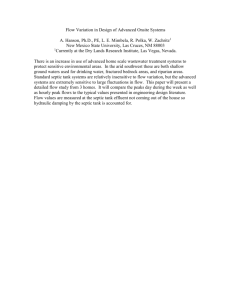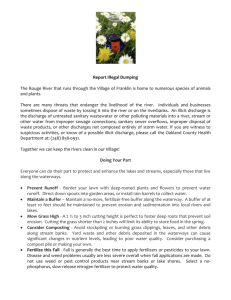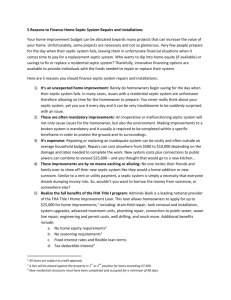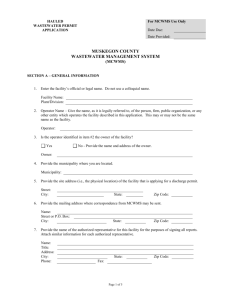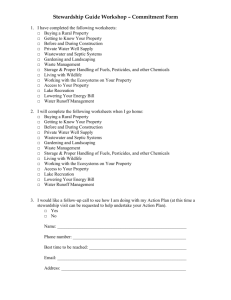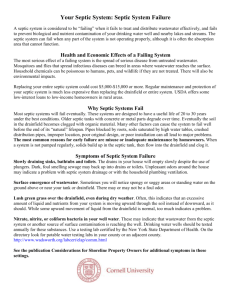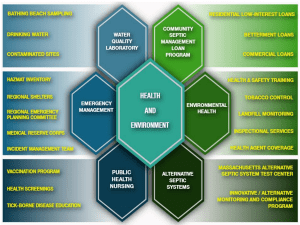septic system maintenance education
advertisement
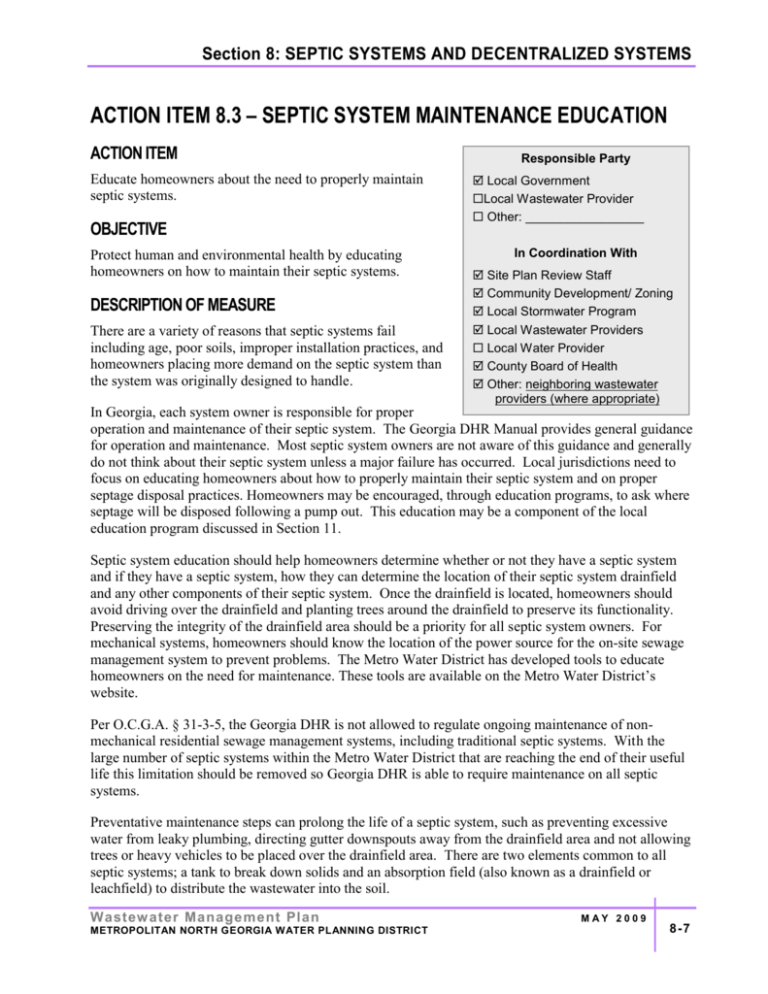
Section 8: SEPTIC SYSTEMS AND DECENTRALIZED SYSTEMS ACTION ITEM 8.3 – SEPTIC SYSTEM MAINTENANCE EDUCATION ACTION ITEM Educate homeowners about the need to properly maintain septic systems. OBJECTIVE Protect human and environmental health by educating homeowners on how to maintain their septic systems. DESCRIPTION OF MEASURE There are a variety of reasons that septic systems fail including age, poor soils, improper installation practices, and homeowners placing more demand on the septic system than the system was originally designed to handle. Responsible Party Local Government Local Wastewater Provider Other: _________________ In Coordination With Site Plan Review Staff Community Development/ Zoning Local Stormwater Program Local Wastewater Providers Local Water Provider County Board of Health Other: neighboring wastewater providers (where appropriate) In Georgia, each system owner is responsible for proper operation and maintenance of their septic system. The Georgia DHR Manual provides general guidance for operation and maintenance. Most septic system owners are not aware of this guidance and generally do not think about their septic system unless a major failure has occurred. Local jurisdictions need to focus on educating homeowners about how to properly maintain their septic system and on proper septage disposal practices. Homeowners may be encouraged, through education programs, to ask where septage will be disposed following a pump out. This education may be a component of the local education program discussed in Section 11. Septic system education should help homeowners determine whether or not they have a septic system and if they have a septic system, how they can determine the location of their septic system drainfield and any other components of their septic system. Once the drainfield is located, homeowners should avoid driving over the drainfield and planting trees around the drainfield to preserve its functionality. Preserving the integrity of the drainfield area should be a priority for all septic system owners. For mechanical systems, homeowners should know the location of the power source for the on-site sewage management system to prevent problems. The Metro Water District has developed tools to educate homeowners on the need for maintenance. These tools are available on the Metro Water District’s website. Per O.C.G.A. § 31-3-5, the Georgia DHR is not allowed to regulate ongoing maintenance of nonmechanical residential sewage management systems, including traditional septic systems. With the large number of septic systems within the Metro Water District that are reaching the end of their useful life this limitation should be removed so Georgia DHR is able to require maintenance on all septic systems. Preventative maintenance steps can prolong the life of a septic system, such as preventing excessive water from leaky plumbing, directing gutter downspouts away from the drainfield area and not allowing trees or heavy vehicles to be placed over the drainfield area. There are two elements common to all septic systems; a tank to break down solids and an absorption field (also known as a drainfield or leachfield) to distribute the wastewater into the soil. Wastew ater Management Plan METROPOLITAN NORTH GEORGIA WATER PLANNING DISTRICT M AY 2009 8- 7 Section 8: SEPTIC SYSTEMS AND DECENTRALIZED SYSTEMS The two basic categories of septic systems include mechanical and non-mechanical systems. Nonmechanical septic systems are the traditional gravity flow system, most common in the Metro Water District. Ongoing maintenance for non-mechanical systems includes pumping out the solids from the tank to preserve the proper function of the drainfield. Pump out frequency is a result of indoor use including the number of people and the presence or absence of a garbage disposal. Pump out intervals are more regular for septic systems that serve a greater number of people or have a garbage disposal. Mechanical systems require electricity and typically have a pump that aids in either the wastewater treatment process or the distribution of the effluent. More frequent maintenance intervals are suggested for mechanical systems because of the dependence on moving parts to make the system function properly. The maintenance requirements of mechanical systems vary depending on the specific manufacturer. SPECIFIC SUB-TASKS Sub-Task Description Implement a septic system homeowner education program Educate homeowners about the need to properly maintain septic systems and about proper septage disposal practices. Wastew ater Management Plan METROPOLITAN NORTH GEORGIA WATER PLANNING DISTRICT M AY 2009 8- 8
